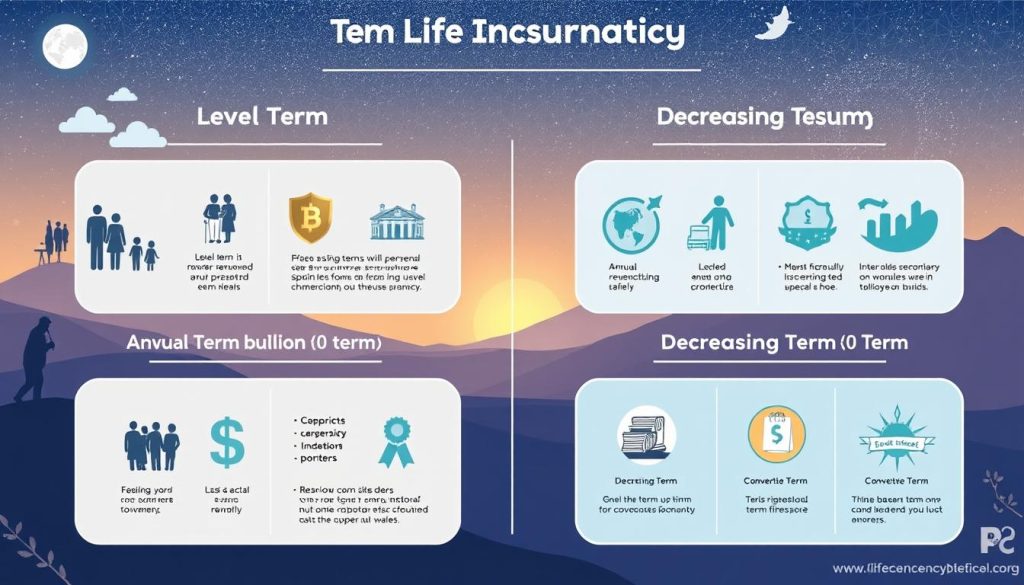In today’s fast world, keeping your family financially safe is crucial. Term life insurance is a key solution. It’s affordable and flexible, fitting your changing needs.
Term life insurance is popular because it’s cheaper than permanent life insurance. It helps protect your family’s future. You can choose how much coverage you need, from $100,000 to over $1 million.
Term life insurance is great because it can grow with your family. You can change your policy as your needs change. This way, your family is protected when they need it most.
Key Takeaways
- Term life insurance offers lower premiums compared to permanent life insurance, making it a budget-friendly option.
- Coverage levels for term life insurance can range from $100,000 to $1 million or more, catering to diverse financial needs.
- Factors like age, health, lifestyle, and occupation can impact term life insurance premiums.
- Term life insurance provides flexibility to adjust coverage as your family’s needs change over time.
- Understanding your family’s specific requirements can help you choose the right term life insurance policy and coverage amount.
What Is Term Life Insurance?
Term life insurance is a common choice for families today. It’s different from whole life insurance because it only lasts for a set time, usually 10 to 20 years. You pay a monthly or yearly premium to keep it active.
Understanding Term Life Insurance Policies
Term life insurance doesn’t grow in value like permanent insurance does. It pays a death benefit to your family if you die during the term. This makes it cheaper, with lower premiums than permanent policies.
Some term life policies let you switch to permanent coverage or renew even if your health changes. They might also offer benefits early if you get very sick or can’t work.
| Feature | Term Life Insurance | Permanent Life Insurance |
|---|---|---|
| Coverage Duration | Temporary (10-20 years) | Lifelong (as long as premiums are paid) |
| Cash Value | No cash value accumulation | Builds cash value over time |
| Premiums | Lower premiums initially | Higher premiums but remain level |
| Death Benefit | Pays a lump sum if you die during the term | Guaranteed death benefit as long as premiums are paid |
Whether term life insurance fits your needs depends on your financial goals. Knowing what term life insurance offers helps you choose the right protection for your family.
Key Benefits of Term Life Insurance
Term life insurance is a smart choice for modern families. It offers financial protection and peace of mind. The death benefit is a key feature – a tax-free payment to your loved ones if you pass away. This can help cover important expenses like mortgages, debts, and raising children.
Another big advantage is its affordability. Premiums are lower than permanent life insurance, making it easier to fit into many budgets. You can also choose a term length that fits your needs, from 10 to 30 years. And, you can adjust the coverage amount as your life changes, keeping your family protected.
Many term life insurance policies come with extra benefits. For example, early access to funds if you’re diagnosed with a terminal illness, or help with premium payments if you become disabled. These features make term life insurance a comprehensive solution for families today.
| Term Life Insurance Benefits | Details |
|---|---|
| Death Benefit | Tax-free payment to beneficiaries upon policyholder’s death |
| Affordability | Premiums are typically much lower than permanent life insurance |
| Coverage Flexibility | Ability to choose term lengths (10-30 years) and adjust coverage amounts |
| Additional Riders | Offer extra benefits like early access to funds or premium assistance |
“Term life insurance is the most affordable way to protect your family’s financial future. The death benefit can provide crucial support during difficult times.”
Types of Term Life Insurance
Term life insurance is a key way to protect your family’s financial future. It comes in three main types:
- Level Term Life Insurance: This policy keeps the death benefit and premiums the same for the term. It’s often chosen for its stability, with a 20-year term being common.
- Decreasing Term Life Insurance: The death benefit goes down over time, but premiums stay the same. It’s great for covering debts as they decrease.
- Convertible Term Life Insurance: This policy lets you switch to permanent life insurance without more medical tests. It’s flexible, adapting to your changing needs.
Choosing the right term life insurance is crucial. Think about your family’s needs and find a policy that balances protection and cost.
| Type of Term Life Insurance | Death Benefit | Premiums | Flexibility |
|---|---|---|---|
| Level Term Life Insurance | Remains the same | Remains the same | Limited |
| Decreasing Term Life Insurance | Decreases over time | Remains the same | Limited |
| Convertible Term Life Insurance | Remains the same | Remains the same | High |
Finding the right term life insurance policy is key. It offers peace of mind and financial security for your loved ones. Take time to explore and choose the best coverage for your family.
Determining Your Term Life Insurance Needs
Figuring out the right amount of term life insurance for your family is key. The DIME formula helps, looking at your Debt, Income, Mortgage, and Education costs. It makes sure your family can keep their lifestyle going even without you.
Another way is to think about how much income you need to replace. Experts say to get coverage that’s 10-15 times your yearly salary. This helps your family stay comfortable without using up the insurance money. Don’t forget to include the value of a stay-at-home parent’s work when figuring out how much coverage you need.
Calculating Your Coverage Amount
Life insurance calculators can help figure out how much coverage you need. They look at your income, debts, education costs for kids, and your family’s future money needs. This way, you can make sure your family is safe financially.
The main goal is to give your family a financial safety net. Whether you use the DIME formula or the income replacement method, aim for coverage that really fits your family’s needs.
“Protecting your family’s financial future is one of the most important decisions you’ll ever make. Take the time to carefully evaluate your term life insurance coverage needs – it could make all the difference in the world.”
Factors Affecting Term Life Insurance Premiums
Several important factors influence term life insurance premiums. Your age, health, lifestyle, and job all affect how much you pay. These elements are crucial in determining your coverage cost.
Being younger means you’ll likely pay less for term life insurance. This is because insurers see younger people as less risky. Your health also matters a lot. Insurers will look at your medical history and current health during the underwriting process.
- Women generally pay less than men for life insurance due to a roughly six-year longer life expectancy according to the CDC.
- Individuals with certain health conditions like high blood pressure, high cholesterol, diabetes, and anxiety or depression are considered riskier to insure, affecting life insurance rates.
- Smoking, including any form of nicotine use, can lead to higher life insurance rates; frequent marijuana users should expect higher rates.
Your lifestyle and job can also change your premiums. Risky hobbies or dangerous jobs might increase your costs. The underwriting process is key. Insurers carefully review your application to match your risk level with your premiums.
| Factor | Impact on Term Life Insurance Premiums |
|---|---|
| Family Medical History | Histories of cancer, cardiovascular disease, and congenital heart disease among immediate family members can influence rates. |
| Driving Record | DUI convictions, reckless driving, or suspended/revoked licenses in the last three to five years may lead to higher life insurance rates. |
| Criminal Record | Recent felonies can impact life insurance eligibility and quotes. |
| Bankruptcy | Recent bankruptcies can affect life insurance approval and rates, with some companies declining coverage for recent filers. |
Understanding these factors can help you make better choices about your coverage. You might be able to lower your costs. Always talk to a financial expert to find the best rate for your policy.
“The underwriting process is key in setting your premiums, as insurers carefully look at your application and consider your age, health, lifestyle, and job to ensure your premiums match your risk level.”
Conclusion
Buying term life insurance is a smart choice for families today. It gives your loved ones the financial safety they need, especially when things are uncertain. By learning about the different term life insurance options, you can pick the best one for your family’s needs and budget.
Term life insurance is a cost-effective way to protect your family’s financial future. It lets you adjust your coverage as your life changes, making it a flexible and practical option. With term life insurance, you can rest easy knowing your loved ones are secure, even if the unexpected happens.
Choosing term life insurance is a smart move for families looking for financial security. It’s good for young professionals, growing families, or those nearing retirement. Take the time to look at your options and find the right term life insurance plan for your family’s needs and budget.
FAQ
What is term life insurance?
How does term life insurance work?
What are the key benefits of term life insurance?
What are the different types of term life insurance?
How do I determine how much term life insurance I need?
What factors affect term life insurance premiums?
Source Links
- Term Life Insurance Demystified: Why It’s the Smartest Decision for Modern Families
- 5 Different Types of Life Insurance & How to Choose in 2024 – NerdWallet
- Term vs. Permanent Life Insurance
- Aflac Supplemental Insurance
- Term Life Insurance: What It Is, Different Types, Pros and Cons
- Term Life vs. Whole Life Insurance: Key Differences and How To Choose – NerdWallet
- Term vs. Whole Life Insurance: Key Differences
- What are the different types of term life insurance policies?
- Different Types of Life Insurance
- How Much Life Insurance Do I Need?
- How Much Life Insurance Should You Have?
- How Much Life Insurance Do I Need? – NerdWallet
- 10 Factors That Affect Life Insurance Premiums
- Factors Affecting Life Insurance Premiums
- 4 Advantages of Term Life Insurance – NerdWallet
- Term Life Insurance: What You Need to Know Before You Buy – Oncology Practice Management
- Term vs. Permanent Life Insurance – Napkin Finance


